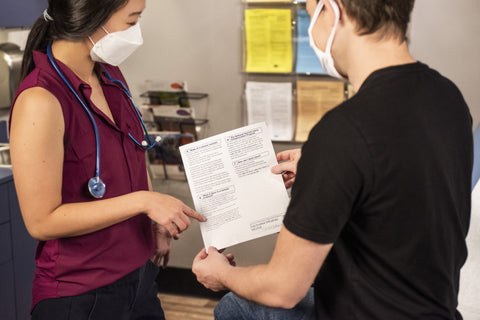Travel Nurse FAQ - Explained

Welcome to the FAQ for travel nurses! In this blog, we'll answer some of the most common questions that travel nurses have about their profession.
Q: What is a travel nurse?
A: A travel nurse is a registered nurse who works on temporary assignments, typically for 13 weeks at a time, in hospitals, clinics, and other healthcare facilities across the United States. Travel nurses are hired by staffing agencies, and their assignments can take them anywhere in the country.
Q: How do I become a travel nurse?
A: To become a travel nurse, you must first obtain a nursing degree and become a licensed registered nurse (RN). You will also need to have at least one year of experience working in a hospital setting. Certifications in Basic Life Support (BLS) and Advanced Cardiac Life Support (ACLS) are often necessary as well. Specialized skills and experience, such as critical care, oncology, and geriatrics, can also be helpful in securing travel nursing assignments.
Q: How does the application process work for travel nursing?
A: To apply for travel nursing positions, you will need to work with a staffing agency that specializes in travel nursing. The application process typically involves filling out an online application, submitting your resume and nursing license, and completing any necessary tests or screenings. Once you are approved by the agency, you can begin searching for assignments that match your preferences.
Q: Is my nursing license good in other states?
A: To work as a nurse in other states, you should arrange to get a compact nursing license. This type of nursing license allows registered nurses (RNs) and licensed practical nurses (LPNs) to practice in multiple states without obtaining additional licenses. The compact nursing license is issued by the Nurse Licensure Compact (NLC), which is an agreement among participating states that allows nurses to have one license to practice in multiple states.
Q: What are the benefits of being a travel nurse?
A: Travel nurses enjoy a number of benefits, including competitive pay, free housing or a housing stipend, health insurance, and travel reimbursement. They also have the opportunity to work in a variety of healthcare settings and gain valuable experience that can help them advance their careers.
Q: What are the challenges of being a travel nurse?
A: Travel nursing can be challenging at times, particularly if you are working in a new environment or with unfamiliar equipment. It can also be difficult to adjust to new colleagues and patients every few months. Additionally, travel nurses may have to deal with the stress of being away from their families and friends for extended periods of time.
Q: How much do travel nurses make?
A: Travel nurse salaries vary depending on a number of factors, including the location and type of facility where they are working, their level of experience, and the staffing agency they are working with. However, travel nurses typically earn more than permanent staff nurses, with hourly rates ranging from $35 to $55 or more.
Q: What kind of housing can I expect as a travel nurse?
A: Housing arrangements for travel nurses vary depending on the staffing agency and the location of the assignment. Some travel nurses are provided with free housing, while others receive a housing stipend that they can use to find their own accommodations. Some travel nurses choose to live in extended-stay hotels or Airbnb rentals, while others opt for short-term apartment rentals or even RV living.
Q: What kind of healthcare benefits can I expect as a travel nurse?
A: Most staffing agencies offer travel nurses health insurance benefits, including medical, dental, and vision coverage. Some agencies also offer life insurance, short-term disability insurance, and retirement plans.
Q: How long are travel nursing assignments?
A: Travel nursing assignments typically last for 13 weeks, although some may be shorter or longer depending on the needs of the healthcare facility and the preferences of the travel nurse.
Q: What kind of support can I expect from my staffing agency as a travel nurse?
A: Your staffing agency will provide you with support throughout your travel nursing assignment, including help with finding housing, arranging transportation, and handling payroll and tax issues. Some agencies also offer mentorship programs and continuing education opportunities to help you advance your career.
According to the United States Bureau of Labor Statistics (BLS), employment of registered nurses (RNs) is projected to grow 9% from 2020 to 2030, which is faster than the average for all occupations. This growth is due to a number of factors, including an aging population that requires more healthcare services, an increased emphasis on preventative care, and advances in medical technology. In addition, there is a growing need for RNs in non-traditional settings, such as home health care, ambulatory care, and long-term care facilities. RNs with specialized skills, such as critical care, oncology, and geriatrics, are also in high demand.
Overall, the demand for registered nurses is expected to remain strong over the next 10 years, offering numerous opportunities for RNs who are looking to advance their careers or explore new avenues within the healthcare field.
Once you become an official travel nurse, you can shop at Green Scrubs for Scrub Hats, Surgical Caps and accessories in a variety of colors and patterns that fit your new professional look. We hope this FAQ has been helpful in answering your questions about travel nursing. Good luck in your adventures as a travel nurse!
Recent Posts
-
Lower Back Pain in Nurses: Causes, Treatment, and Prevention
Nurses are at a high risk of developing low back pain (LBP) due to the physical demands of their job
-
Dealing with Alzheimer's Disease as a Health Care Worker and protecting yourself from the onset of Alzheimer's
Alzheimer's disease is a progressive brain disorder that causes memory loss and other cognitive decl


